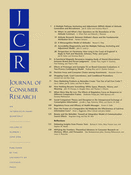-
Views
-
Cite
Cite
Leonard Lee, Dan Ariely, Shopping Goals, Goal Concreteness, and Conditional Promotions, Journal of Consumer Research, Volume 33, Issue 1, June 2006, Pages 60–70, https://doi.org/10.1086/504136
Close - Share Icon Share
Abstract
We propose a two-stage model to describe the increasing concreteness of consumers' goals during the shopping process, testing the model with a series of field experiments at a convenience store. Using a number of different process measures (experiment 1), we first established that consumers are less certain of their shopping goals and construe products in less concrete terms when they are in the first (vs. second) stage of the shopping process. The results of experiments 2 and 3 next demonstrate that goal-evoking marketing promotions (e.g., conditional coupons) are more effective in influencing consumers' spending when consumers' goals are less concrete.



